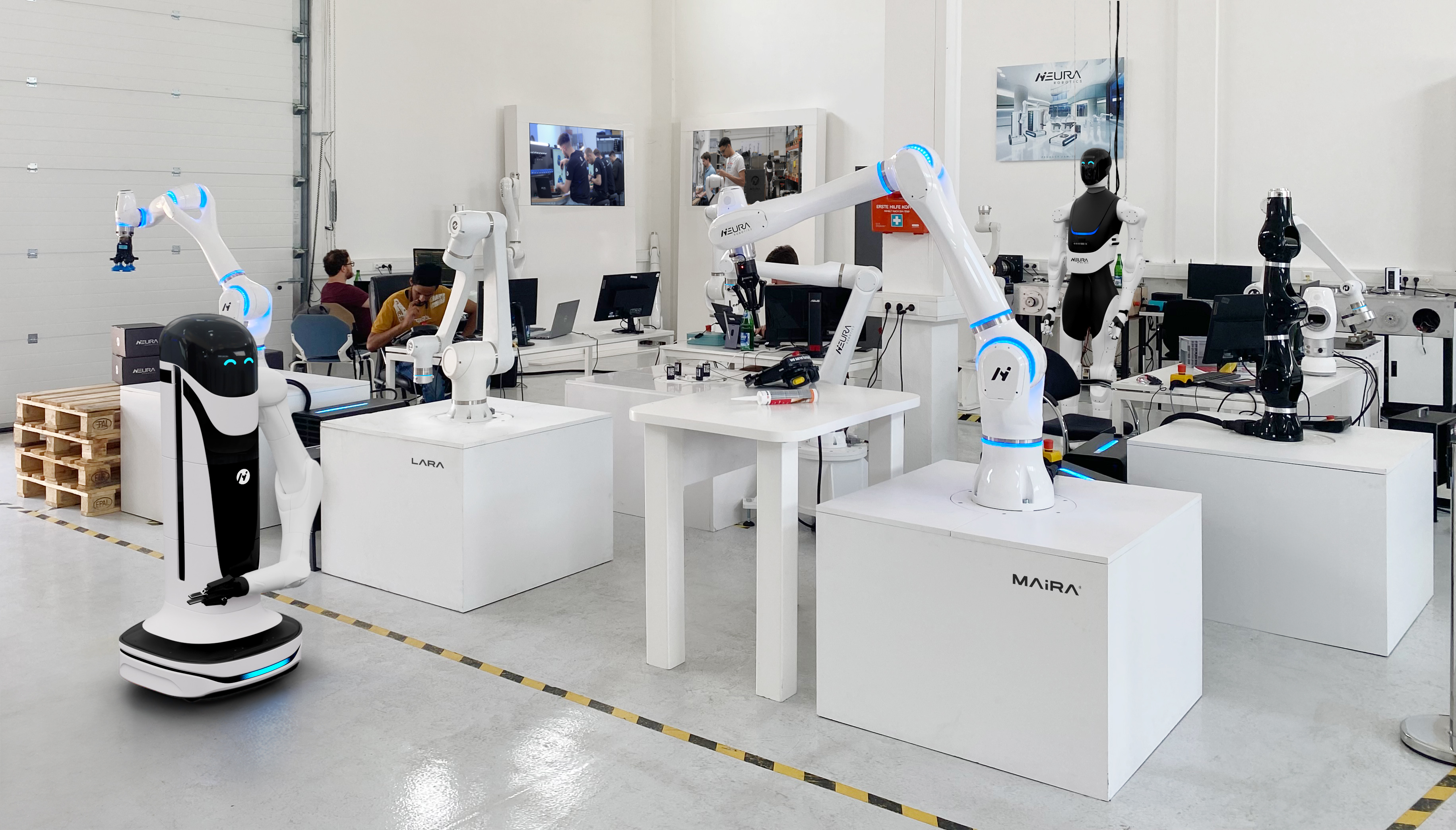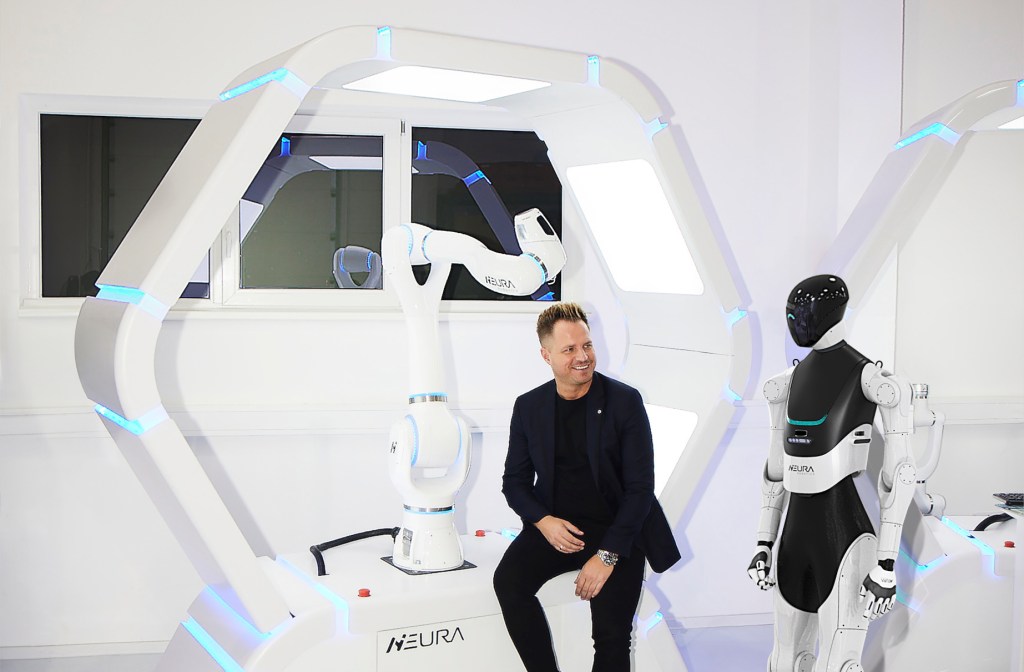Neura Robotics, a German startup that since 2019 has been building cognitive robots — machines that possess memory, the ability to operate across a complex and changing mix of variables, and can collaborate with people (“cobots” as Neura calls them) — has raised $55 million. It plans to use the funding to fuel more R&D and to expand its business in Asia and the U.S., and it will be using some of it to beef up manufacturing: The company says its order book is now at $450 million over the next five years.
“The actual demand of our customers is much higher, but currently still limited by our production capacities,” David Reger, Neura’s CEO and founder, told TechCrunch. (Reger is pictured above with some of Neura’s robots.)
The funding is coming from Lingotto (an investment management company that is part of PE firm Exor N.V.), plus Vsquared Ventures, Primepulse and HV Capital. The valuation is not being disclosed, but the deal represents a shift for the startup.
Neura previously raised around $80 million, with all of that coming from a strategic backer, Han’s Group, the China-based conglomerate known best for property development, but also with holdings in hotel operation and property management, equipment manufacturing and healthcare. Before this latest investment, Reger said the company decided to buy out the previous backer to clear the cap table and make way for pure financial investors.
“In today’s deglobalized world, we have decided that Neura as an independent company has much more potential worldwide and that a partnership is more beneficial for both companies,” he told TechCrunch in an email.
Want the top robotics news in your inbox each week? Sign up for Actuator here.
While there is definitely a lot of vaporware, and “coming soon”-ware in the world of advanced autonomous systems, robotics startups have actually delivered more than others, and Neura is among them.
The company currently has three models covering both robotic arms and more “human” forms — the MAV mobile robot, the LARA “high-end cobot,” and MAiRA, which it describes as the “world’s first cognitive robot.” The company’s model appears to be primarily B2B, and potentially B2B2C, for now. For example, Reger said that one of its customers, Japan’s Kawasaki, “[is] already selling their own cobot series based on our platform.”

Prices for the industrial models range between €5,000 and €40,000, while an upcoming MiPA service robot, aimed at offices, care facilities, and homes, “will be priced well below ten thousand euros.”
Before founding Neura, Reger had already spent seven years in the space of robotics, both in management roles and in developing robots for industrial applications. If you look at his LinkedIn profile, it appears that he’s been less on the technical and more on the conceptual side of that R&D, but that may have given him an advantage in building a robotics business himself, since he had a strong idea of what customers were looking for.
In almost all industrial projects, he said, “we had to adapt the existing environment to the robot — usually in a very complex and expensive way — in order to meet the high safety requirements.” He went on:
The industry had always done this for decades without anyone questioning it much. But I was sure that in the long run, it would make more sense to modify the robots themselves so that they could be used safely in any environment alongside humans. It was clear to me, even in 2019, that it was possible to equip robots with senses and give them the ability to process perceptions quickly and safely. But as is often the case in a mature industry, it’s difficult to leave the comfort zone and enter uncharted territory. Otherwise, we would have had an alternative to the internal combustion engine much longer ago. So, I ended up founding my own company to realize my idea of cognitive robotics.
Reger’s “casual” description of what cognitive robots means says something about the functionality that the company aims to create with its machines. “I would say that smartphones are coming with arms and legs,” he says of Neura’s devices. “In other words, assistants that relieve us not just virtually, but in very real terms. Physically.”
The platform that Neura has built can be trained and operated in any language and dialect, he said, and they work online and offline. Cobots have additional features on them so that they can work with and alongside humans, with sensors and safety features that allow them to stop or adjust their movements if a person comes into contact with them, Reger said.
The company’s big bet is that making the entire package — software plus hardware — is the way forward in this space. That includes not just fashioning all the sensors and other components, but also building the AI that powers it. This also means that Neura can collaborate better with its customers, with a platform that partners can use to jointly develop specialized apps in areas like welding, warehousing, gluing, sanding, and assembly.
“If you are serious about software, you need to embrace hardware,” said Dr. Herbert Mangesius, general partner at Vsquared Ventures, in a statement. “This is particularly true for robotic automation and has been a bottleneck in bringing cutting-edge machine learning and cognitive capabilities into the industrial and services world for many years. Neura Robotics is the first company we met that combines this technological vision and leadership with an open partnership model and such driving progress globally at a never-seen pace within robotics.”
In the future, Neura wants to expand more directly into the consumer market, Reger said.
“We are focusing on the industrial applications such as welding, warehousing, gluing, sanding, and assembly but all our know-how and technology goes into our MiPA service robot platform, which can help in offices, in care and even in the home,” he said. The aim is to keep up the pace it’s set so far, and deliver that cognitive “one-device robotic platform” in two years. “Humanoid robots by Neura that collaborate with humans across various societal domains and within human-designed environments could be real in just a couple of years — and provide a solution to the general shortage of skilled workers,” Reger said.
That said, the company is not vertically integrated to the extent that it will not work with third parties: Its AI can be used on any robot via an API it provides, and the hardware it makes has both the app ecosystem and the willingness of Neura to work with customers to create whatever is needed by them.
“We provide a technology platform to which partners from around the world, not just robotics, can connect. Our components and robots combine with the countless ideas and know-how from a wide range of industries,” he continued. “This makes many special applications possible in a very short time that we couldn’t serve alone. The best way to compare this is with a smartphone and its operating system, which has only really come to life and become indispensable thanks to millions of apps from all sectors.” He says the company has even branded this ambition: “the Neuraverse.”
In a market that does have a lot of proprietary approaches, it’s indeed an ambitious concept, but investors seem to believe Neura can deliver. “Neura operates at the confluence of AI and hardware development. Germany and Europe have a particular advantage here,” said Nikhil Srinivasan, managing partner at Lingotto, in a statement.































Comment